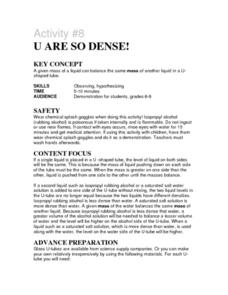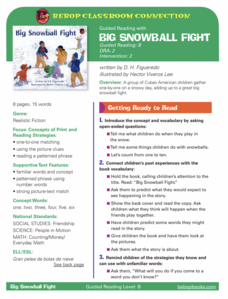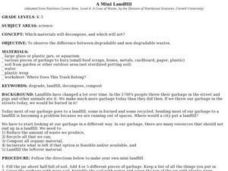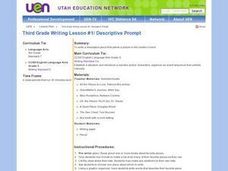Curated OER
Economics Study Guide
Use this resource as a basic review of economic principles. There are six questions relating to the factors of production, opportunity costs, wants and needs, tangibles and intangibles, and more.
Lesson Locker
Macbeth: Act Four Questions for Study
Readers of Macbeth can use these study questions to keep track of key events in Act IV of Shakespeare’s tragedy. Consider adding interpretative and evaluative questions to encourage analysis and critical thinking skills.
Curated OER
Paper Plate Sunflowers
A great way to recall the parts of a flower is to make one. Little learners create sunflowers out of paint and paper plates. They also discuss and label the various parts of their flowers.
Curated OER
Addition and Subtraction Facts to 20
Students act out computation problems. In this addition and subtraction lesson, students act out an addition story and write an addition sentence for it. Students continue this activity and answer the provided questions.
Curated OER
More on Temperature and Solubility
High schoolers discover how temperature effects the solubility of solutes by experimenting with a range of temperatures. They develop skills for observing, inferring, measuring, comparing and contrasting.
Curated OER
Help! I Need Five Minutes to Study
Students learn to use a time grid or a calendar to increase productivity of their studying. In this studying lesson, students record how they spend their studying time and then adjust as needed. Students recognize various...
Curated OER
Activity #8 U Are So Dense!
Students watch as the teacher demonstrates: if a single liquid is placed in a U-shaped tube, the level of liquid on both sides are the same. When the mass is greater on one side than the other, liquid is pushed from one side to the...
Curated OER
Hands On: Regroup in Multiplication
In this regrouping in multiplication worksheet, students learn to solve the multiplication word problems using the regrouping strategy. Students also use base-ten blocks to solve the problems.
Curated OER
Comparative Adjectives
Students rewrite adjectives to show comparisons by adding -er to the end of the adjective. They create new adjectives to compare two different groups. Worksheet is included.
Curated OER
City-County Track Meet
In this problem solving worksheet, students solve 1 word problem about a track meet. Students determine the number and type of medals won by each school given a set of clues.
Curated OER
Using the Calendar
In this math worksheet, students use a sample calendar to learn how to solve word problems. Detailed directions are given on how to solve different kinds of problems. There is a one page information sheet and one page of 15 word problems...
Curated OER
Rice Math
Fourth graders practice basic subtraction facts using a number grid. In this rice math lesson, 4th graders figure out how much more they need to get to a specific number. Students complete a chart of examples and then play a...
Curated OER
Breaking News English: Kids and Alcohol
In this kids and alcohol activity, students read the article, answer true and false questions, complete synonym matching, complete phrase matching, complete a gap fill, answer short answer questions, answer discussion questions, write,...
Curated OER
Bonding
In this bonding learning exercise, high schoolers read about the octet rule in bonding, ion notation, ionic bonds, covalent bonds and oxidation numbers. Students write 2 ion notations, they determine if 8 sets of ions will make...
Curated OER
Big Snowball Fight
Students complete pre reading, writing, during reading, and interdisciplinary activities for the book Big Snowball Fight. In this reading lesson plan, students complete journal entries, answer short answer questions, have discussions,...
Curated OER
Breaking News English: Robots in Japan
For this Robots in Japan worksheet, students read the article, answer true and false questions, complete synonym matching, complete phrase matching, complete a gap fill, answer short answer questions, answer discussion questions, write,...
Curated OER
A MINI LANDFILL
Learners observe the difference between degradable and non-degradable wastes. They create their own landfill in a jar by adding four or five pieces of garbage and then covering it with dirt and water. They make observations on what they...
Curated OER
Is Our Electoral System Fair?
In this U.K. government worksheet, students study the electoral system of the United Kingdom as they read a 3 page article and complete up to 6 activities based on the topic. A debate form with 10 points pertaining to the topic is...
Curated OER
Everyday Mathematics: Counting Up
In this counting up worksheet, young scholars learn strategies to help them solve problems involving change. Students study a number grid and number line to help them count up to make change.
Curated OER
Jim's Table
Students analyze given number table and insert numbers working with a partner. Class share their ideas and solutions and answer specific questions about the table discussing their answers.
Curated OER
Breads Around the World
Pupils read about bread. In this instructional activity studying bread, students read about the history of bread and it's significance around the world. Pupils identify the three main crops used to make bread and ten common types of...
Curated OER
Third Grade Writing Lesson #1/Descriptive Prompt
Third graders read aloud a book about a favorite place. They make and share a list of favorite places and then use a graphic organizer to write a description of a favorite place so that the reader can imagine being there.
Curated OER
Counting On
For this math worksheet, students practice addition of one digit numbers and adding on addition. Students start with one set, then add more. Example: Gus Plus has 5 cubes. He collects 8 more. He now has----. There are 18 problems on this...
Curated OER
Solubility Equilibria
In this solubility equilibria worksheet, students solve five problems. They calculate concentrations of ions at equilibrium, they determine the effects of adding compounds to a saturated solution and they determine if compounds are more...























